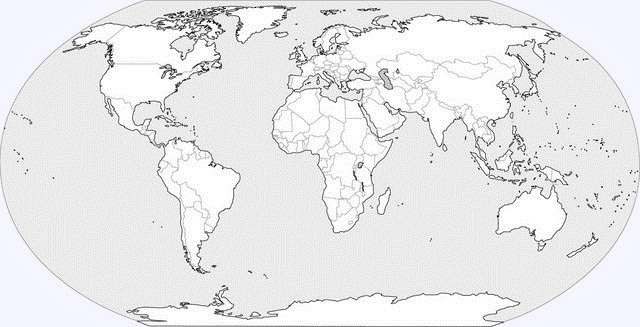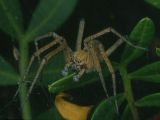|
Nombre común en ingles:
Jamping spiders
Nombre común en castellano:
Se desconoce
Familias similares:
Género tipo:
Salticus Latreille, 1804
Diagnosis:
Small to large araneomorph
spiders; two tarsal claws; ecribellate; entelegyne; eight eyes;
carapace squarefronted with four, forwardly directed eyes of which
the anterior median eyes are very large.
Caracteres descriptivos:
Caparazón:
square-fronted; length varies from short to long; cephalic region
high in some genera; eye region frequently decorated with clusters
of long setae. Esternón:
shape variable, sometimes narrower in front. Ojos: eight; in
three or four (Lyssomaninae) rows; eyes occupying entire width of
carapace; anterior median eyes very large, anterior lateral eyes
slightly smaller, both pairs directed forward; other eyes directed
to the sides or backward. Quelíceros: inner margin with one
tooth (unidentate), several teeth (pluridentate) or a split tooth
(fissidentate); chelicerae sometimes enlarged and porrect in males. Piezas bucales:
labium rectangular or rounded and narrowed in front; endites fairly
long, broadened distally with well developed scopula and serrula. Patas:
two claws usually with claw tufts; rather short; anterior pair in
some genera longer or stronger than other legs, frequently decorated
with tufts of setae. Palpo femenino:
tarsus without claw. Abdomen: variable, short to oblong or
elongated in some genera. Hileras:
short, anterior and posterior pairs similar in lengh; without
cylindrical glands and spigots. Sistema respiratorio:
two booklungs; tracheal spiracle close to spinnerets. Genitalia:
entelegyne; epigyne variable; male palp with tibial apophyses,
sometimes also with femoral protuberance; embolus variable in shape. Tamaño corporal:
3-17 mm. Color: sometimes with bright, attractive colouration
consisting of bands, stripes or speckles; body sometimes bearing
special setae, sometimes iridescent.
Estatus taxonómico:
The position of the Salticidae remains problematic. Coddington &
Levi (1991) and Coddington et al. (2004) group them in the Dionycha
based on the absence of cylindrical gland spigots.
Distribución: mundial.

Estilo de vida: Diurnal,
cursorial hunting spiders with well developed vision. They occur in
a wide variety of habitats.
Bibliografía:
-
Davies, V.T. & Zabka,
M. 1989. Illustrated keys to the genera of jumping spiders (Araneae:
Salticidae) in Australia. Mem. Qd Mus. 27: 189-266.
-
Dippenaar-Schoeman, A.S. & Jocqué,
R. 1997. African Spiders: An Identification Manual. Plant Protection
Res. Inst. Handbook, no. 9, Pretoria, 392 pp.
-
Maddison, W.P. &
Hedin, M.C. 2003. Jumping spider phylogeny (Araneae: Salticidae).
Invert. Syst. 17: 529-549.
-
Prószynski, J. 2003.
http://salticidae.org/salticid/main.thm
-
Prószynski, J. 2006.
http://www.gsd-salt.miiz.waw.pl/
-
Richman, D.B.,
Edwards, G.B. & Cutler, B. 2005. Salticidae. pp. 205-207 in Ubick, D., Paquin, P., Cushing, P.E. &
Roth, V. (Eds) 2005. The Spiders of North America. An Identification
Manual. American Arachnological Society.
-
Zabka, M. 1985.
Systematic and zoogeographic study on the family Salticidae (Araneae)
from Vietnan. Annls zool. Warsz. 39: 197-485.
-
Zabka, M. 1988.
Salticidae (Araneae) of Oriental, Australian and Pacific regions,
III. Annls zool. Warsz. 41: 421-479.
36 géneros y 128 especies presentes en la Península Ibérica:
|
| |
- A.
aeruginosus
(Simon, 1871) |
| |
- A. balearus
Azarkina, 2006 |
| |
- A. blandus
(Simon, 1871) |
| |
- A. bosmansi
Azarkina, 2006 |
| |
- A. luctuosus
(Lucas, 1846) |
| |
- A. v-insignitus
(Clerck, 1757) |
|
| |
- B. chalybeius
(Walckenaer, 1802) |
| |
- B. rufipes
(Simon, 1868) |
| |
- B. variegatus
Simon, 1876 |
|
| |
- B. albobimaculatus
(Lucas, 1846) |
|
| |
- C. xanthogramma
(Latreille, 1819) |
|
| |
- C. atratus
(Thorell, 1875) |
| |
- C. infimus
(Simon, 1868) |
| |
- C. janetscheki
(Denis, 1957) |
|
| |
- C. algerina
(Lucas, 1846) |
|
| |
- D. fulviventris
(Lucas, 1846) |
| |
- D. rudis
(Sundevall, 1833) |
|
| |
- E. acripes
(Simon, 1871) |
| |
- E. alticola
Denis, 1955 |
| |
- E. difficilis
(Simon, 1868) |
| |
- E. frontalis
(Walckenaer, 1802) |
| |
- E. gambosa
(Simon, 1868) |
| |
- E. herbigrada
(Simon, 1871) |
| |
- E. innotata
(Simon, 1868) |
| |
- E. nigritarsis
(Simon, 1868) |
| |
- E. patellaris
Denis, 1957 |
| |
- E. rosenhaueri
L. Koch, 1856 |
| |
- E. rufibarbis
(Simon, 1868) |
| |
- E. semiglabrata
(Simon, 1878) |
| |
- E. sulphurea
(Simon, 1867) |
| |
- E. terrestris
(Simon, 1871) |
|
| |
- E. arcuata
(Clerck, 1757) |
| |
- E. falcata
(Clerck, 1757) |
| |
- E. jucunda
(Lucas, 1846) |
| |
- E. laetabunda
(C. L. Koch, 1846) |
|
| |
- H. bovei
(Lucas, 1846) |
| |
- H. ibericum
Dalmas, 1920 |
| |
- H. ornaticeps
(Simon, 1868) |
| |
- H. pullatum
Simon, 1876 |
|
| |
- H. adansoni
(Audouin, 1826) |
|
| |
- H. aeneus
(Hahn, 1832) |
| |
- H. agricola
Wesolowska, 1986 |
| |
- H. apiatus
Simon, 1868 |
| |
- H. auratus
C. L. Koch, 1835 |
| |
- H. cupreus
(Walckenaer, 1802) |
| |
- H. dubius
C. L. Koch, 1835 |
| |
- H. flavipes
(Hahn, 1832) |
| |
- H. ibericus
Wesolowska, 1986 |
| |
- H. kochii
Simon, 1868 |
| |
- H. lineiventris
Simon, 1868 |
| |
- H. melinus
L. Koch, 1867 |
| |
- H. patagiatus
Thorell, 1875 |
| |
- H. ramosus
Wesolowska, 1986 |
| |
- H. rufithorax
Simon, 1868 |
| |
- H. tribulosus
Simon, 1868 |
|
| |
- I. congener
Simon, 1871 |
| |
- I. crassipes
(Simon, 1868) |
| |
- I. hamatus
(C. L. Koch, 1846) |
| |
- I. insolitus
Alicata & Cantarella, 1994 |
| |
- I. subinermis
Simon, 1937 |
|
| |
- L. berolinensis
(C. L. Koch, 1846) |
| |
- L. mutilloides
(Lucas, 1846) |
| |
- L. peresi
(Simon, 1868) |
|
| |
-
M. cata
(Blackwall, 1867) |
| |
-
M. nidicolens
(Walckenaer, 1802) |
|
| |
-
M. muscosa
(Clerck, 1757) |
| |
-
M. nivoyi
(Lucas, 1846) |
|
| |
-
M. canestrinii
(Ninni, 1868) |
|
| |
-
M. bivittatus
(Dufour, 1831) |
| |
-
M. illigeri
(Audouin, 1826) |
| |
-
M. semilimbatus
(Hahn, 1829) |
| |
-
M. taeniatus
(L. Koch, 1867) |
|
| |
-
M. formicaria
(De Geer, 1778) |
|
| |
-
N. membrosa
(Simon, 1868) |
|
| |
-
N. convolutus
Denis, 1937 |
| |
-
N. levis
(Simon, 1875) |
| |
-
N. rayi
(Simon, 1875) |
| |
-
N. reticulatus
(Blackwall, 1853) |
| |
-
N. robustus
Lohmander, 1945 |
|
| |
-
P. arciger
(Walckenaer, 1837) |
| |
-
P. brevis
(Simon, 1868) |
| |
-
P. geniculatus
(Simon, 1868) |
| |
-
P. nigrociliatus
(Simon, 1875) |
| |
-
P. tripunctatus
(Walckenaer, 1802) |
|
| |
-
P. albovariegatus
(Simon, 1868) |
| |
-
P. chrysops
(Poda, 1761) |
| |
-
P. jugatus
(L. Koch, 1856) |
| |
-
P. varicus
(Simon, 1868) |
|
| |
-
P. castriesiana
(Grube, 1861) |
|
| |
-
P. bresnieri
(Lucas, 1846) |
| |
-
P. cinereofasciata
(Simon, 1868) |
| |
-
P. fasciata
(Hahn, 1826) |
| |
-
P. loripes
Simon, 1876 |
| |
-
P. sierrana
(Simon, 1868) |
| |
-
P. simoni
L. Koch, 1882 |
|
| |
-
P. paykulli
(Audouin, 1826) |
|
| |
-
P. erratica
(Walckenaer, 1826) |
| |
-
P. lanigera
(Simon, 1871) |
| |
-
P. vafra
(Blackwall, 1867) |
|
| |
-
P. encarpatus
(Walckenaer, 1802) |
| |
-
P. tamaricis
Simon, 1885 |
|
| |
-
S. barbipes
(Simon, 1868) |
|
| |
-
S. cingulatus
(Panzer, 1797) |
| |
-
S. confusus
Lucas, 1846 |
| |
-
S. major
(Simon, 1868) |
| |
-
S. mutabilis
Lucas, 1846 |
| |
-
S. propinquus
Lucas, 1846 |
| |
-
S. scenicus
(Clerck, 1757) |
| |
-
S. zebraneus
(C. L. Koch, 1837) |
|
| |
-
S. aurocinctus
(Ohlert, 1865) |
| |
-
S. tantulus
(Simon, 1868) |
|
| |
-
S. caricis
(Westring, 1861) |
| |
-
S. floricola
(C. L. Koch, 1837) |
| |
-
S. pubescens
(Fabricius, 1775) |
| |
-
S. rupicola
(C. L. Koch, 1837) |
| |
-
S. saltator
(O. P.-Cambridge, 1868) |
|
| |
-
S. albotrimaculatus
(Lucas, 1846) |
| |
-
S. dalmaticus
(Keyserling, 1863) |
| |
-
S. hilarulus
(C. L. Koch, 1846) |
| |
-
S. venator
(Lucas, 1836) |
|
| |
-
T. aequipes
(O. P.-Cambridge, 1871) |
| |
-
T. parvistyla
Logunov & Kronestedt, 2003 |
| |
-
T. petrensis
(C. L. Koch, 1837) |
|
| |
-
T. imperialis
(Rossi, 1846) |
|
| |
-
Y. albifrons
(Lucas, 1846) |
| |
-
Y. algarvensis
Logunov & Marusik, 2003 |
| |
-
Y. salsicola
(Simon, 1937) |
| |
-
Y. squamifer
(Simon, 1881) |
| |
|
 |